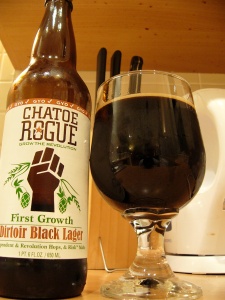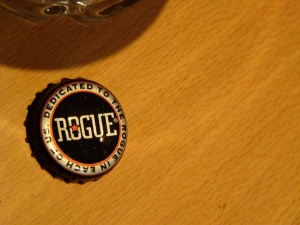(6% American make from a 650ml bottle) Dirtoir Black Lager is the second in the Grow Your Own series from Rogue Ales. A modern twist on a classic German-style Schwarzbier, this lager will win you over. What’s in a name you say? A lot apparently, and Rogue did not want to leave any doubt in your mind with this one. The dirtoir is a play on the French word noir meaning black, while the black fist gripping hops and malts with the slogan ‘Grow the Revolution’ leads us to believe this is an act of rebellion not just consumption.
The taste!
This black lager presents on pour a thick, opaque body with a dark mocha coloured head. It smells of chocolate and sweet malts, which hints at the ensuing taste. With a fine, rich chocolate and roasted malt taste on the front, it has a nice bitter touch on the end which together make it smooth in the mouth while providing a long-lasting finish. This bottle conditioned, black lager does not disappoint with its rich flavour profile and well-balanced mouth feel.
This wonderful taste profile is accomplished through the following Rogue Brewery grown ingredients: Melanoidin, Carafe Special II Black, Chocolate and Rogue Micro Barley Farm first growth Risk Malts; Rogue Micro Hopyard first growth Independent and Revolution Hops; German Yeast and Free Range Coastal Water. No chemicals, preservatives, or additives.
When looking at the bottle, one wonders how strong is this beauty? Funny thing is that it does not say its strength, but rather gives a run down of some seemingly confusing acronyms where one would expect something like a number and % for ABV. Well, so we are all better for the knowledge, here is a quick lesson in what I can gather about some complex subjects. The following is a run down of the description of the beer’s characteristics as described by Rogue, and what they mean:
- 15° Plato: The Plato Scale is an alternative to using Specific Gravity, both measure the amount of sugars in a solution. In brewing, it is the measurement of sugar in the wort and beer. The Plato Scale has the advantage of quantifying the amount of sugars available for fermentation. This beer has 15° on the Plato Scale. Now, the way to figure out the strength of the beer, according to their FAQs page, is to take the Plato number and divide it by 2.5 for a rough estimate of the strength. So, here the strength is roughly 6% (15°/2.5 = 6). Easy right?
- 35 IBU: The scale for determining a beer’s bitterness derived from the hops is measured in IBUs, or International Bitterness Units. Beers with a higher malt content, for example a black lager such as this or a stout, will have more IBUs in order to balance out the malt flavour and produce a balance profile.
- 68 AA : The AA stands for Apparent Attenuation. This a measurement of the amount of sugars fermented by the yeast, and is derived by looking at the original gravity (that before fermentation) and the final gravity (after fermentation).
- 75° L: The scale used to quantify the colour of the beer is Lovibond, and is measured in degrees (°) L. You can think about it as a colour spectrum for beer: on one side are your pale lagers and pils, on the other are porters on up to imperial stouts. This is an important distinction in judging a beer which, as explained by friend and font of micro-brewing knowledge, Steve Schrader, can allow the trained eye to ascertain even what malts were used. As he explains, Guinness will fall somewhere around 35°, with the black colour having entered the scale at around 25°. If you shine a light through it, you will see it illuminate the brew to a ruby-red colour. This beer, a jet-black lager, weighs in at 75° and is more akin to motor oil. Drink up!
For even more information on the science of brewery can I suggest signing up to the B.U.Z.Z group for their newsletter. They meet monthly in what is my local micro-brewery back in the States, Iron Hill Brewery.
GYO!?
As per the bottle, this lager is, “Dedicated to Farmers and Fermenters. GYO is a Rogue Ales term for Grow Your Own. We made this beer with our own hops and barley”. Removing links in the supply chain not only decreases cost, but also allows for more control over the product. In this case, it started first with hops. When a few years back there was a global hop shortage, prices went up ten fold. Brett Joyce, the president of Rogue Ales, is quoted in the Chicago Tribune as saying, “We wanted to make sure that we never had to tell our brew master that we didn’t have hops for him to use.” And so it began that they purchased and now operate a full farm where they produce their own hops and barley.
The style!
This beer is an excellent example of a particular German-style lager called a ‘Schwarzbier’, literally meaning ‘black beer’. Bottom fermenting yeasts from Rogue called ‘Oktoberfest’ eat up the malt sugars to produce this fine lager. The chief difference between this and traditional lighter lagers is the presence of dark, roasted malts which gives it the chocolate taste and its opaque colouring.
The oldest surviving commercial example of this beer is Köstritzer Schwarzbier, famed as the beer enjoyed by Goethe, author of Faust. Whether the black brew was an inspiration for his Mephistopheles we will never know. This brewery is situated in the state of Thuringia in what used to be a part of the GDR, or Deutsche Demokratische Republik (East Germany). Having survived numerous wars and the Communist aquisition of the brewery after WWII, it has been producing the black stuff since as early as 1543 when it was first recorded.
Cheers!
Rogue’s rendition of this classic German-style black lager is an a winner, and a great example of micro-brewing in the US. While utilising classic styles and recipes, Rogue has been able to take a beer style with some considerable history and make it their own. I believe that this beer is more than worthy of praise and purchase not only due its well-balanced taste, but also due to the fine craftsmanship and care taken to bring this often over-looked style to life. The fact that is brewed with Rogue’s own farm raised ingredients assures you of the controls taken to ensure this beer is in top form.


Looks delicious. This is the beer I am drinking tonight as part of my blog. Great review!
Pingback: Organic Beer Review # 3: Black Isle Hibernator Oatmeal Stout « Tales of ales and more…·